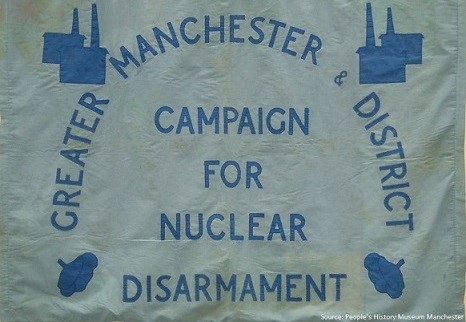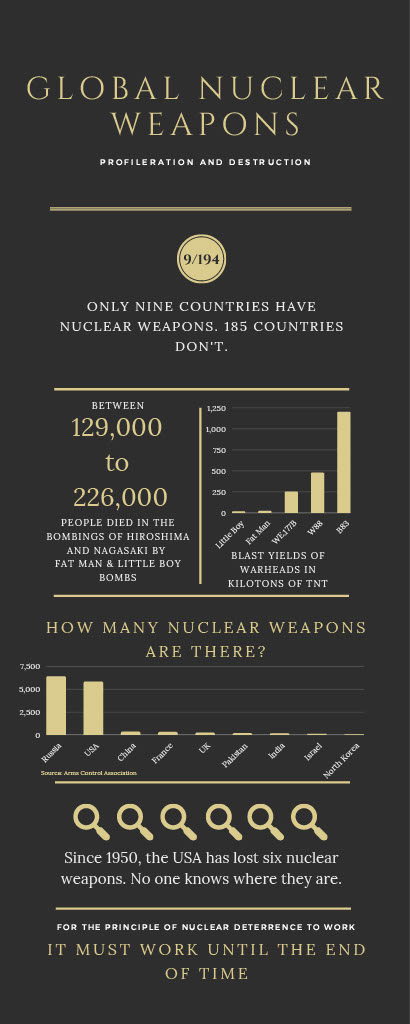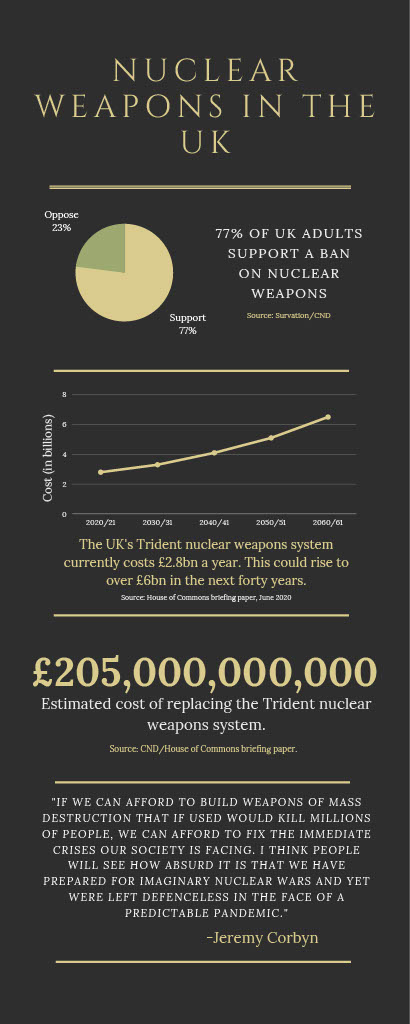The Greater Manchester branch of the Campaign for Nuclear Disarmament (CND) met on Friday to mark the UN’s ratification of the Treaty on the Prohibition of Nuclear Weapons (TPNW).
The CND has been leading the fight against Nuclear Weapons in the UK and hailed the new treaty as an important step towards a nuclear-free world.
Campaigners from the Greater Manchester CND took part in an online protest over Zoom, as their plans to celebrate in the streets of Manchester were dashed by the Coronavirus restrictions.
Rae Street, who has campaigned with CND for 40 years, said: “To get to this point, which we thought we might never get to in my lifetime, was wonderful.”
Members of CND, which was set up in 1957, have tirelessly fought against nuclear weapons, and see this new treaty as a big step towards their eradication.
The organisation said: “From its founding meeting, CND has championed the global abolition of nuclear weapons.
“This treaty is a victory for grassroots campaigning and our anti-nuclear movement.”

Jeremy Corbyn, who recently launched his Project for Peace and Justice, has been a member since he was 15, and lauded the movement’s role in global nuclear disarmament.
He said: “At the height of the Cold War, many of us lived in real day-to-day fear of nuclear annihilation.
“As geopolitical tensions around the world continue to rise, those of us who lived through those years do not want to return to them.
“The anti-nuclear movement came out of those fears and reflects the simple reality that most people would rather live in a peaceful world.
“I think the movement has shaped politics profoundly, paved the way to breakthroughs like the TPNW, and will continue to do so.”
The treaty has been signed by 120 countries and aims to bring about a world free of nuclear weapons.
Those states that have signed the treaty are prohibited from developing, testing, owning, and threatening anyone with nuclear weapons.
Mr Corbyn said: “The 120 countries signing or ratifying the treaty clearly show a growing consensus against these horrific, expensive, and totally unnecessary weapons.”
However, the nine states that own nuclear weapons, including the UK, have not signed up to the treaty, meaning there is no legally enforceable mechanism to make these states disarm.
The treaty wasn’t just designed to create a legal framework to make countries disarm, though.
It also aims to paint nuclear weapons in the same light as biological and chemical weapons, which have been prohibited on humanitarian grounds.
Dr Laura Considine, Lecturer in International Relations at the University of Leeds, said: “The foundation of the treaty is to change the socially-understood meaning of these weapons from objects of security to fundamentally inhumane, inhuman, and stigmatised weapons.”
What does this mean for the UK’s nuclear weapons?
Immediately, not a lot.
The UK currently uses a nuclear weapons system known as Trident, which is made up of four submarines loaded with nuclear missiles operating from the west coast of Scotland.
The idea behind the Trident system is deterrence: that by owning nuclear weapons, that dissuades people from using nuclear weapons against you, so that nuclear war never happens.
However, Dr Considine says that this philosophy is inherently flawed, and said: “Deterrence always has to work: if deterrence only fails once, then the consequences of that are so extreme.
“Deterrence has to work every moment of every day, for the rest of our lives and the future, or else it’s catastrophic.
“People are fallible; systems fail.”
The costs of the programme alone are high: the scheme currently costs around £2.8 billion a year, and this cost rises every year.
Not only that, but the system is aging, and will need to be replaced at a huge cost.
The CND estimates that a replacement will cost £205 billion, and a more conservation estimate by the Nuclear Information Service puts the cost at £175 billion.
Immediately, however, the UK has no plans to join the new UN treaty, which would commit the nation to disarming.
Instead, when the treaty was first published in 2017, the government announced that it would not sign up.
A statement by the UK government said: “As we have previously made very clear, we do not believe that this treaty will bring us closer to a world without nuclear weapons.
“The UK has not taken part in the negotiation of this treaty, and does not intend to sign, ratify or become party to it. The treaty will therefore not be binding on the UK.”
The government is instead relying on the older nuclear disarmament treaty: the 1968 Nuclear Non-Proliferation Treaty.
Under this treaty, the government is obliged to disarm eventually, but gives no legally binding pressure or timeframes to reach this goal.
Echoing the government’s official statement, Conservative MP Robbie Moore said: “The best way to achieve a world without nuclear weapons is through gradual multilateral disarmament, negotiated using a step-by-step approach, provided for under the Treaty on the Non-Proliferation of Nuclear Weapons.”
CND members say that this older treaty doesn’t go far enough, and does not commit the government to disarming.
Sylvia Boyes, who campaigns with CND, said: “The nuclear weapons states wish to hold onto their nuclear bombs rather than disarm them.
“We are going silently along with the threat of nuclear weapons to future generations. And that is a crime against humanity. That is the moral issue of our age.”

Among the public, nuclear weapons are unpopular, and according to polls carried out by the CND and Survation, 77% of British adults support a ban on nuclear weapons.
Jeremy Corbyn argues that this consensus should spur political action and said: “Politicians across the spectrum need to be bold in making the argument for a nuclear-free world.
“From the pandemic to the climate crisis, we have enough global threats already without creating and exacerbating more.”
Dr Considine believes that the new treaty will help the campaigning by groups like CND, and will be an invaluable tool in their campaigning efforts.
She said: “The CND can now point out that there’s this international treaty.
“The UK says that they’re a responsible international actor, but why aren’t they working with this treaty to try and get rid of these terrible weapons.”
For opponents of nuclear weapons, the only way to ensure a safe planet is the eradication of nuclear weapons, and this treaty is only the start.
Ms Street, the intrepid CND campaigner, said: “We don’t see it as an end in itself.
“This is the beginning: there’s a lot further to go.”
For more information about the CND, visit this link: https://cnduk.org

